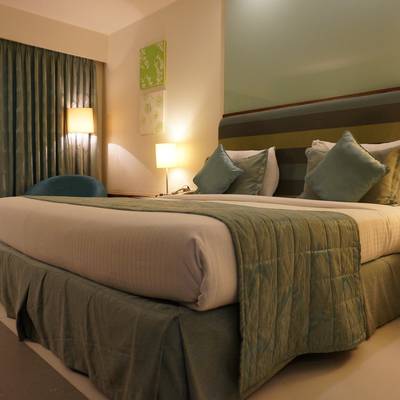
What are the accommodation options in Germany?
With so many tempting possibilities, deciding where to stay in Germany can turn into a dilemma. Should you choose ultra-modern hotels or charm-filled historic properties? Should you dream away your nights at country inns, fairytale castles, or pampering spa resorts? Even if you’re on a budget, Germany’s lodging options include hotels, B&Bs, and hostels that are among Europe’s very best.
Hotels. Many hotels in Germany have aligned themselves with a voluntary five-star Deutschen Hotelklassifizierung rating system based on the assessment of 280 criteria by an independent body. This ensures that participating one-star establishments have rooms of up to 12m squared, with en-suite toilet and shower; that three-star hotels offer larger rooms, a minibar and 24-hour call on reception even if they are not manned; and that in five-star places, you will enjoy rooms of at least 18m squared and luxuries such as 24-hour room service and reception, and laundry services. Whether aligned to the Deutschen Hotelklassifizierung system or not, German hotels are generally comfortable enough for you to have few complaints; they are clean, generally en suite except in the cheapest establishments, and rooms nearly always come with a TV. All hotels provide breakfast, generally buffet-style and included in the price of your room, but do double-check. You can expect to pay around 80–120 EUR for a double in an average mid-range hotel.
Pensions and inns (B&B). A shift away from the formality and anonymity of blander hotel chains is the pension: by and large smaller, cheaper establishments, often in large houses or in city apartment blocks. What they lack in mod-cons – you’ll usually have to share bathroom amenities, for example – they make up in character in the form of personal service and homely decor. In Bavaria they are often called a Gästehaus; a similar style can be found in a Gasthof or a Gaststätte, which roughly translates into English as an inn or a guesthouse. Accommodation is generally above a traditional restaurant – that it is often in a historic building is all part of the charm of a stay, although bear in mind that this means room dimensions are historic, too. For obvious reasons these are especially prevalent in small towns and in the countryside. Both pensions and inns will provide breakfast. Click here or here to search for a B&B.
Private rooms. A step down from the pension or inn is the private room in the house of locals. Priced from around 15 EUR, these are rarely more expensive than 30 EUR, making them a valuable alternative to the hostel for budget travellers. At their best, private rooms offer a chance to dip a toe into everyday life and to glean the insider information from a local host. Such intimacy may not be to all tastes, however. Tourist information offices can book rooms, or look for signs advertising Zimmer frei or Fremdenzimmer, or source rooms (and apartments) online at this website or this one.
One of the most notable developments in German accommodation in the past decade is the rise of farmstays. Beloved by city families as a rural escape, and often good bases for country pursuits such as walking or riding, these are classified either as Landurlaub (country holiday) – former farms or country houses with typical regional charm – or as Urlaub auf dem Bauernhof (farm holiday) which provide rooms on working farms and vintners. Many of the latter feature home-made produce for breakfast and, on occasion, evening meals – but you’ll obviously need your own transport. Find a farm stay suitable for you.
Hostels. Hostels target independent travellers rather than groups – indeed, some refuse organized groups to preserve the communal vibe. German hostels tend to be relaxed and friendly, with a young international clientele. Most are small, often in converted houses or apartments in a city’s nightlife district, and will typically provide laundry facilities, a communal TV lounge, internet access (or WiFi) and perhaps a games room. Accommodation is in mixed dormitories, typically from four- to cheaper ten-bed, as well as in double or twin rooms, and a handful of singles. Some hostels operate single-sex dorms – washrooms are nearly always segregated. Bed linen is generally included in the price and a simple buffet breakfast is available for around 3–5 EUR. Many hostels have noticeboards advertising work and cheap activities and many also rent bikes. Staff are generally young, well-travelled and knowledgeable about the local area. The one negative to consider is that city dorm rooms are not conducive to early nights, especially those in bar districts. Many independent hostels are listed at this website and at this one. The prices for a bed in a hostel start at around 10 EUR per night.
Camping. As a nation besotted with the outdoors, Germany has over 2500 campgrounds nationwide, most sited beside lakes or in the bosom of some inspiring landscape. Most are above average by European standards: even the most basic will have a dedicated reception, often with a mini-shop, and offer full washing facilities, while high-end sites are more like resorts, often with an outdoor pool, restaurants, a bar and a supermarket, and organized activities for kids. However, German campsites can be seriously uptight, often sterile places with row after tidy row of caravans and motorhomes sprouting satellite TV antennas. Prices, which vary according to the facilities, are by pitch and the number of people plus a car if you have one. Some charge a euro or two for showers – you may have to buy tokens from reception – and electricity, if required. The website of the Federal Association of German Campsites has a searchable database of 1300 sites organized by region, and publishes a highly condensed guidebook of sites (2.50 EUR) that can be ordered through its website. Free camping is illegal on environmental grounds.
Vacation Rentals. Apartment and home rentals provide more spacious quarters and can be less expensive than booking multiple hotel rooms when traveling with family or a group of friends. The agencies and websites that specialize in offering these types of properties have listings ranging from studios in the city to villas in the country. Among the sources to try are Airbnb and HomeAway.

Is there a coffee and tea culture in Germany?

Where to buy alcohol in Germany and how much does it cost?

Am I expected to tip in Germany?

How much does the food cost?

What to do in Berlin on a budget?

 Where in Berlin should I stay?
Where in Berlin should I stay?
 Where in Munich should I stay?
Where in Munich should I stay?
 Where in Hamburg should I stay?
Where in Hamburg should I stay?